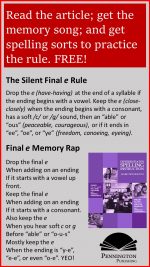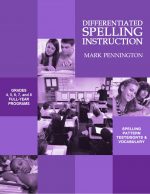The Consonant-Final e Spelling Rule
The silent final e at the end of a syllable is a holdover from Middle English. It sometimes serves three purposes.
- For one, it usually indicates that the preceding vowel will be a long sound if a single consonant, but not a double consonant, is placed between the vowel and the e. Examples: stove, gazelle
- It also ends English words ending in v and u Examples: pave, argue
- Lastly, the final e softens the preceding /c/ and /g/ sounds. Examples: nice, cage
Yes, there are plenty of exceptions which must be memorized. Most of the exceptions are high frequency words. In fact the top 100 non-phonetic words, in terms of frequency, include 8 of them: were, where, there, some, come, gone, sure, lose
However, the single syllable silent final e words are not the spelling problem for most students. It’s the multi-syllabic words in which as suffix is added on the ending silent final e that creates the spelling challenges, so that’s what the following spelling rule addresses.
The Final e Spelling Rule
Drop the e (have-having) at the end of a syllable if the ending begins with a vowel. Keep the e (close-closely) when the ending begins with a consonant, has a soft /c/ or /g/ sound, then an “able” or “ous” (peaceable, courageous), or if it ends in “ee”, “oe”, or “ye” (freedom, canoeing, eyeing).
Exceptions to the rule: acknowledgment, acreage, argument, awful, duly, judgment, mileage, ninth, noticeable, outrageous, simply, truly, wisdom
Check out the Chant! The Final e Spelling Rule
Final e Memory Chant
Drop the final e
When adding on an ending
If it starts with a vowel up front.
Keep the final e
When adding on an ending
If it starts with a consonant.
Also keep the e
When you hear soft c or g
Before “able” or “o-u-s”
Mostly keep the e
When the ending is “y-e”,
“e-e”, or even “o-e”. YEO!
The Pennington Publishing Goldmine of Spelling Program FREEBIES
Want a concise list of all eight conventional spelling rules with corresponding songs? Click HERE.
Want a list of the 10 English Accent Rules to help you teach the conventional spelling rules? Click HERE.
Want a list of the 20 Advanced Syllable Rules to help you teach the conventional spelling rules? Click HERE.
Want the 104-word Diagnostic Spelling Assessment with audio file and recording matrix? Click HERE and download at the end of the article.
One great way to practice the rule is with worksheets targeted to the results of the Diagnostic Spelling Assessment. Download the FREE Double the Consonant Spelling Pattern Worksheets at the end of this article to help you check out the quality of Our Pennington Publishing spelling programs. Each worksheet sound-spelling example words, a spelling sort, rhymes or book searches, word jumbles, a short writing application, and a brief formative dictations assessment.
Why waste your time downloading each of these? Buy the grades 4, 5, 6, 7, or 8 Differentiated Spelling Instruction and get everything you need to have the best grade-level and remedial spelling program.
*****
A Model Grades 3-8 Spelling Scope and Sequence
Preview the Grades 3-8 Spelling Scope and Sequence tied to the author’s comprehensive grades 3-8 Language Strand programs. The instructional scope and sequence includes grammar, usage, mechanics, spelling, and vocabulary. Teachers and district personnel are authorized to print and share this planning tool, with proper credit and/or citation. Why reinvent the wheel? Also check out my articles on Grammar Scope and Sequence, Mechanics Scope and Sequence, and Vocabulary Scope and Sequence.
FREE DOWNLOAD TO ASSESS THE QUALITY OF PENNINGTON PUBLISHING AMERICAN ENGLISH AND CANADIAN ENGLISH SPELLING PROGRAMS. Check out these grades 3-8 programs HERE. Administer my FREE comprehensive Diagnostic Spelling Assessment with audio file and recording matrix. It has 102 words (I did say comprehensive) and covers all common spelling patterns and conventional spelling rules. It only takes 22 minutes and includes an audio file with test administration instructions. Once you see the gaps in your students’ spelling patterns, you’re going to want to fill those gaps.


